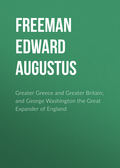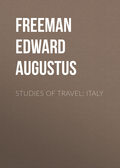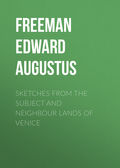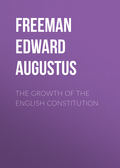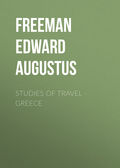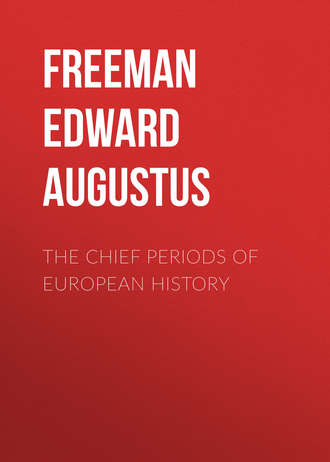
Freeman Edward Augustus
The Chief Periods of European History
At a later time the opposite process has taken place in many lands. Gaul and Germany after a very near approach to union, Italy after an approach far more distant, split up again into a crowd of states, practically if not formally independent. The still abiding theory of the Empire forbade either the free city or the duchy or county to put on that avowed independence which had belonged to every free Greek city, to every barbarian kingdom, in the days before the Empire was. But practically cities and principalities took to themselves all the powers of independent states, even to that of making war on their overlord. In Gaul indeed, besides the splitting up of the land among the dukes and counts, there was the splitting off of the land itself from the body of the Empire. As the German poet sings;
“Et simul a nostro secessit Gallia regno,
Nos priscum regni morem servamus, at illa
Jure suo gaudet, nostræ jam nescia legis.”
In that part of Gaul which became France in the later sense, we might even say that a nation was forming and splitting in pieces at the same moment. It is hard to distinguish the process by which the house of Robert the Strong became Dukes of the French from that by which they became Kings of the French. In either case we see that the word Franci now means, at least west of the Maes and the Saone, something very unlike what it had meant in the days of Chlodowig. The new nation, the nation formed out of three elements, the Mischvolk der Franzosen, the nation which still kept in Latin the name of the old Teutonic Franks, is fast forming. Its language is forming; there is a lingua Romana of Northern Gaul, which is felt to have become distinct from the lingua Latina of books, which is felt before long to be distinct from the other forms of the lingua Romana in Italy, Spain, and Southern Gaul. There is a French people, speaking a French tongue. But the nation, while forming, is splitting asunder. At the very moment when the duchy of France is changing into the kingdom of France, a crowd of smaller duchies and counties are falling off from it. By the strangest chance of all, the duchy is dismembered on behalf of Scandinavian settlers. Their coming might have been almost expected to call into fresh life the waning Teutonic element in Gaul. In truth the new comers from the North, while keeping all their native energy, became disciples of French speech and French culture; and it was in truth their help which enabled the French kingdom to come into being. The typical Romance nation was thus formed, itself a nation in the strictest sense, though it has since done much to absorb and assimilate parts of the other nations on its borders. Yet we may perhaps see in the growth of the French nation, at least as compared with England and Scandinavia, some influences from the city-life of more southern lands. The nation grows round a city in a way in which no Teutonic nation has done; Paris is the centre, nay the cradle, of France in a way in which no chief city of any Teutonic land can be said to be. The other cities, the ancient heads of tribes, kept a headship over the districts which shared their names such as never belonged to the towns of England. When we pass out of France into Southern Gaul, we find another state of things, a state of things approaching to that which is to be seen in Italy, a state of things far more nearly recalling the elder state of Southern Europe. In both lands the cities, though not forming, as in old Greece, the whole political life of the country, are a conspicuous element; in Italy they are the predominant element. As the power of the Emperors gradually died out in their kingdoms of Italy and Burgundy, the land split up into a crowd of practically independent states, among which free commonwealths again played their part alongside of principalities. On the greatness of the Italian cities I need not now dwell; but it is important to remember, first, that, though the history of the cities is the most brilliant and the most attractive part of mediæval Italian history, yet the cities never spread over the whole land, as they did in old Greece; secondly, that the political phænomena of Italy appear, though with less brilliancy and for a shorter time, in the neighbouring lands of Gaul. Provence, the land once so deeply touched by Greek influences, had for a moment her commonwealths no less than Lombardy. Massalia, which had braved the might of Cæsar, again braved the might of Charles of Anjou, and found the Frenchman a far harsher conqueror than the Roman. Aquitaine too, the other land of the tongue of oc, if not so distinctly republican as Provence, yet stands distinguished from France as emphatically a land of civic growth and civic privilege. The importance and independence of the cities grow as we go on a south-eastward journey through England, France, Aquitaine, Provence, and Italy.
We have been opposing cities to nations; but it is easier to define a city than to define a nation. I think we may say, at least for our purpose, that the ideal nation is found when all the speakers of the same tongue on a continuous territory are united into a single political whole, which includes no speakers of other tongues. The nation in short should have unity of speech and unity of government. It would be hard to find a nation which exactly answers this definition, but the nearer a political body answers to it, the nearer surely does it come to the highest type of a nation. I think that, when we find anything else, when we find men of several tongues under the same government or men of the same tongue under several governments, we instinctively ask the reason. The reason may be a good one or it may not; but we cannot help asking the reason; the thing is, at the first look of it, an anomaly. Now free cities, with all their merits, are the greatest of all legitimate hindrances to national unity. I say of legitimate hindrances, of hindrances which come of themselves and which have something to be said for them, as distinguished from hindrances caused by external and unrighteous force. Italian unity was impossible as long as Milan and Venice were kept apart from the Italian body by the brute force of the House of Austria; but Italian unity was no less impossible in the days when Milan and Venice – Milan for a moment, Venice for ages – played a part in the affairs of the world as independent commonwealths. Italy, the land of free cities, has, largely because it had been the land of free cities, been of all the lands of Europe that which most thoroughly split asunder, that which most thoroughly became, in the well-known words of her enemy, a mere geographical expression. Germany, in her most divided days, was still far from being so utterly divided as Italy. Save during the few years of French ascendency, her princes and cities always kept up some kind of mutual relations towards one another. Germany always had a national Diet; Italy had none.
The Italian nation has been at last united in our own days, and we all rejoiced in its union. Yet we may be allowed to doubt whether the union was not a little too speedy and a little too thorough. It is surely carrying unity too far to wipe out all traces of the independent being, for most purposes to wipe out the very name, of such a land as Sicily. It jars on our feelings to find that, while Ireland at least forms part of the royal style of its sovereign, Sicily is no longer even a geographical expression. The island realm of Roger has sunk to be seven provinces of the kingdom on the mainland. And there is another result of Italian unity, a result in which we may rejoice without drawbacks, but which still has somewhat of sadness about it as finally ending that great phase of the history of Europe with which we have throughout been dealing. Never were ties with the past so fully snapped as when the army of Italy entered liberated Rome. Of all novelties in European history the greatest was when Rome became the centre of a dominion with acknowledged metes and bounds, the head in short of a local Italian kingdom. “Rome the capital of Italy” was a formula which might well gladden our hearts; but it was a formula which formally swept away the œcumenical position, the œcumenical traditions, of Rome. Till that day some shadow of her œcumenical position had lived on. Under the temporal dominion of her Bishops, she was indeed the temporal capital, not of all Italy but of a part. But the temporal headship of the part did not wipe out the œcumenical position as is done by the temporal headship of the whole. Rome was not the mere head of the Papal States; the Papal States was something which her Bishops held as a temporal appendage to their position as Bishops of the œcumenical city. But the kingdom of Italy is not an appendage to Rome; Rome is the head of the kingdom. The whole is greater than its part; Rome, by her own free will and by the free will of Italy, has become less than Italy. By becoming the willing head of an Italian kingdom she has formally cast aside her Imperial traditions as they were not cast aside when brute force made her the head of a French department. The deliverance of 1870 was the formal record of the fact that, in the sense in which I used the words in the opening of this lecture, the world is Romeless.
While Italy then, the special land of free cities, was slow in rising to national unity, the neighbouring land in which free cities showed themselves only for a moment has never reached national unity at all. Bondage to the modern map, the familiar use of geographical names only in their most modern sense, hinders men from seeing that the lands of Southern Gaul, the lands of the tongue of oc, that is Aquitaine and the Imperial Burgundy, had in them all the elements of national life just as truly as Italy or Spain, or as that very France in which their national being has been merged. We are apt to talk as if, because those lands are French now, therefore they have been French from all eternity, or at least as if it had been in the eternal fitness of things that they should become French some day. Aquitaine indeed owed a formal and nominal homage to the French crown; but Provence and the other Burgundian lands were as fully independent of the Kings of Paris as any land of Spain or Italy. The Karolingian dominion, that Frankish kingdom which had grown into a Western Empire of Rome, broke up, as our own Chronicler has told us better than any other record, into the four kingdoms of Germany, Burgundy, Italy, and the Western realm that was to become France. In the course of ages the Western kingdom has annexed the Middle kingdom; it might have been the order of things that the Middle kingdom should annex the Western. The course of the world’s history might have been that, instead of Arles, Vienne, or Lyons bowing to Paris, Paris should bow to Arles, Vienne, or Lyons. In a land whose geography was so largely ruled by ecclesiastical divisions, it might not have seemed wonderful if the seat of the Primate of Primates or of the Primate of all the Gauls had won even temporal precedence over the simple bishopric of Saint Denys and Saint German. The reason why no South-Gaulish nationality was able to maintain itself is most likely to be found in the specially divided political relations of those lands. Aquitaine and the Imperial Burgundy have so much in common, so much that is utterly unlike anything in France, that, had they had the faintest chance of political union, they might have formed a true nation. But there was no moment, under Romans, under Goths, under Franks, when the two lands formed a political whole apart from any other land. Aquitaine and Burgundy were ever parted, each by itself was split in pieces, while Neustria and Austria ever kept some measure of union, enough to enable them to grow into the great realms of France and Germany. And so the Kings of Paris could bit by bit swallow up the divided land. They could not only annex the lands west of Rhone which owed them a formal homage, but they could spread their power, slowly and surely, over the fairer lands, the more royal cities, which knew no king but Cæsar.
But a fragment has escaped. Cities there still are of the old Burgundian realm, cities both of Romance and of Teutonic speech, from which the kingship of Cæsar has passed away, and which have not bowed the neck to any meaner lord. The Middle kingdom still has its representative in Europe; but that representative is no longer a kingdom but a free confederation. Massalia the twice free – Aquæ Sextiæ with her memories of Roman victory and Provençal countship – Arelate where kings took their crown in life and Vienna that sheltered them in death – Lugdunum whose name once spread to the Ocean and the British sea – all these have passed away; but Lausanne and Geneva still sit unchained beside their lake – modern freedom has not wiped out the memory of ancient kingship at Neufchâtel and Payerne – Basel, Basilia, in her very name brings up the thoughts of Empire, fit thoughts in a city where men so long defied the claims of Rome in her newer garb – and high above them all, younger and mightier, still stands the city by the Aar, the home of old patricians, the city looking forth upon her subject mountains, the Bern of Berchthold, yet nobler than the Bern of Theodoric, the city which, in days when the Middle kingdom might seem to have been forgotten, a poet of her own could greet in a twofold garb,
“Als Krone im Burgundenreich,
Als freier Städte Krone.”
There is thus still a free and abiding fragment of the old realm of that King Boso who, when men questioned his kingship, could tell them that he was “Dei gratia id quod sum.” But of a Burgundian nationality Europe now knows no trace. The fragment of free Burgundy that is left has joined with two other brands snatched from the burning, a fragment of Germany, a fragment of Italy, to form a political nation, none the less truly a political nation because it does not coincide with any nation defined by blood or speech. A fragment of the English folk, a fragment of the British, a fragment of the Irish, joined together to make for us that people of the Northern England which, among its other merits, has kept alive, under another name, the purest form of the English tongue. If we could not spare Scotland in our island world, our alter orbis, still less could we spare Switzerland in the wider world of the European mainland. A fragment of the German, the Burgundian, and the Italian folk, have come together to show us, in this age from which the power of Rome has vanished, one lively image of the age when the œcumenical power of Rome had not yet risen. Athens, like Rome, has sunk to be a seat of local kingship; Achaia still lives, if not on her own Mediterranean shore, yet in the lands which reproduce her political life. She lives in a figure in the mountain land, the home of all that is oldest and newest in Western tradition and Western thought. And she lives too in a figure in the vaster federal and vaster English land beyond the Ocean. We indeed feel the Unity of History to be a living thing when we see the work of Markos of Keryneia and Aratos of Sikyôn reproduced on two such widely different scales in the younger hemisphere and in the elder.
Thus in the Latin-speaking lands and on the central march of the Teutonic and Latin-speaking lands nations have grown up of themselves, they have failed to grow up, or they have been formed by an artificial union. But the city, as an independent political unit, has vanished. Even in Switzerland the city is subordinate to the artificial nation; and we can hardly say that any Swiss canton is now a city commonwealth in the older sense. The people of the surrounding district, once commonly a subject district, have everywhere won for themselves equal rights with the people of the town. If Baselstadt is a purely town-community, it is because Baselland has won for itself, not only equality but separation. In other lands the cities are simply members of the kingdom or commonwealth, though we have seen that, where cities once were great, nations have found it harder to grow into nations than elsewhere. In other parts of Europe, Celtic, Teutonic, Slavonic, nations have grown up without reference to cities at all. The Teutonic and the Slavonic political units are both something very unlike a city; the Celtic political unit is something yet more unlike. In none of these parts of Europe did the native political developement take the course which it took in Greece or Italy or even in Gaul, and the Roman influence was naturally immeasureably less than it was in Southern Europe. In all these lands the city is everywhere a direct importation from the South. It may be a real Roman colony; it maybe a Teutonic or Slavonic community shaping itself after the pattern of a Roman colony. Nowhere was the city a thing of purely native growth, nowhere was the independent city the ruling political idea around which all political life gathered. In one land indeed, in the central land, the land which took specially to itself the Teutonic name, cities did indeed become great and famous; but they became great and famous only under the conditions which I have just laid down. It was fitting that the German nation which sheltered its own Holy Roman Empire should conform to Roman traditions more nearly than England, Scandinavia, or the Slavonic lands. Cities therefore became an important element in the German kingdom. The oldest Germans looked on a walled town as a prison; yet in after days cities and city-life found the German land no unkindly soil. The Roman cities by the Rhine lived on, and became models for cities of more purely Teutonic birth. The Colony of Agrippina had its capitol no less than the Tolosa of Quintus Cæpio, and it seemed only in the nature of things that patricians should gather round it. Saxon kings, Saxon dukes, made younger cities arise after their model in the heart of the German land or on the shore of the Northern Mediterranean. Nor must we forget that other cities at which we have glanced already – will any one grasp my meaning and all that it suggests if I speak of one of them as “Verona in montibus?” – were simply cities of the German realm, to which circumstances gave in the end a fuller freedom than their neighbours. Zürich herself, “nobile Torregium,” “die uralte, löbliche, eidgenössische Stadt,” reckons among her titles of honour that the judgement-seat of Cæsar was so often held within her walls. In course of time that special home of Imperial power passed away, together with her fellows, from all dealings with Cæsar and his Empire. Others clave to their old allegiance till a new Francia reaching to the Baltic and the Hadriatic supplanted the ancient realm which was at once Francia and Romania. Those free cities of the Empire which lingered on till our own century came, like the cities of the Alpine land, of divers forms of growth. Augsburg – Augusta Vindelicorum – proclaimed herself to all time as of Roman and Imperial birth; round Nürnberg none but Teutonic memories can gather. And by the Northern and the Eastern sea, by the banks of Weser, Elbe, and Trave, cities arose which were called to a still higher and a more abiding destiny. Merchants, missionaries, self-styled crusaders, joined their efforts to plant German cities on the conquered shores of the Wend and of the older folk beyond him, folk beside whom modern Europe and her nations feel as intruders on foreign soil. The League of the Saxon Hansa, a power for which, as a League, we can hardly find a geographical place on land, became mighty indeed and memorable upon the seas. London and Novgorod formed parts of one union of trade and enterprise; the merchant cities could give law to the kingdoms of the North and could place whom they would on thrones which in Cnut’s day had looked to Winchester and which were now taught to look to Lübeck. But here too, as in more southern lands, the greatness of cities was not abiding. The League drooped; its members fell away; three only lived through the last storm to claim a revived freedom in the first new birth of Germany seventy years back. Three-and-twenty years ago I saw those cities still sovereign and independent; in theory more sovereign and independent than they were in the days of their might. On the coins of Lübeck was still graven, if not the image, yet the superscription of Cæsar; the Hanseatic city seemed to have put forth no marks or shillings since the days of the first Francis from Lorraine. But Cæsar lived only in his superscription; Lübeck knew no lord on earth; she was bound by no ties save those which bound her to her two Hanseatic sisters and to the lax Confederation which still numbered a single inland city among its members. The next year after my visit the tale of free cities was shortened, the freedom of those that still lived on was shortened also. Frankfurt has sunk from the rank of a commonwealth to become a city of a local kingdom; Lübeck, Bremen, Hamburg, are still commonwealths, but commonwealths which are again members of an Empire. They are survivals, but survivals which modern Europe, Romeless Europe, the Europe of huge kingdoms and of countless armies – happy when kingdoms mean nations and when armies do not simply keep down unwilling subjects – cannot spare from the midst of her. The age of free cities is past; in some lands the mere high-handed robbery of the stranger has wiped them out, as where the fetters of the meanest of oppressors still clank over enslaved Ragusa. In other lands the loss of local freedom has perhaps been outweighed by admission into a wider national unity. In two lands again the commonwealths still abide, tempered only by the obligations of a federal tie. But a federal tie is one thing when it binds together a group of lands and cities none of which could now stand alone; it is another thing when the federation has an Imperial head, when three surviving cities are grouped with duchies and kingdoms which could at any moment overwhelm them, and when duchies and kingdoms are again grouped in fellowship with another kingdom greater than cities, duchies, and kingdoms joined in one. Yet to this day the free city, even if shorn of its old greatness, its old independence, is still an element in our modern Europe. Those three surviving cities of the great Hansa are precious fragments indeed, fragments in one sense of a world when the Roman power had put on its German garb, reminders in another sense of a world on which the Roman power had not yet risen. As we trust never to see the day when the bull of Uri and the bear of Bern shall cease to be badges of a freedom more than municipal, so we trust never to see the day when Imperial Germany shall cease, among the ensigns of its free confederate members, to reckon ensigns more worthy of honour than the banners of dukes and kings, the towers of Hamburg, the key of Bremen, and the eagle-shield of Lübeck.
I have done my desultory picture of our Romeless world, desultory and imperfect as must be every picture attempted in lectures such as these, the object of which is not the communication of minute knowledge on any point. I am still at the threshold of my work. Some solid work I think I have done in inner chambers with the small and faithful band who follow me, who sometimes guide me, through book after book of the historian of the Franks. But what I have as yet preached, so to speak, on the house-tops has been in its own nature general and desultory. I have not, strictly speaking, been teaching; I have been purposely talking in a way which might call up memories in some and might stir up to inquiry in others. But through the general we make our way to the particular. Next term I trust to make even these more public lectures of a more solid kind. I have run with a swift pace through a general view of the Methods of Historical Study, through a general view of the chief periods of European history. This last series fills up for this year the tale of forty-two lectures which the iron rule of our masters demands from me. With such necessity laid upon me, I should think it savoured of arrogancy and impiety if I ventured on such a voluntary work of supererogation as a forty-third lecture. What the Commissioners deem enough you doubtless deem enough; so to-day I bring my desultory story to an end. In October I hope to begin a more regular course, and to make a path, through a true understanding of the early history of Gaul, to a true understanding of the early history of Britain. And I have one word more to say. Since I came here I have learned several things, I have learned one in particular. I have hitherto always shrunk from crying my own wares, from advertising my own writings. Whenever I have quoted myself or referred to myself, it has been with a feeling of doing something that one should be ashamed of. But I have learned in this place where I now stand, from a colleague who is now no longer a colleague, how very silly such modesty is, and how much better it is to quote oneself and talk of oneself as freely as one quotes and talks about anybody else. I will tell you then that a few years back I gave two courses of lectures on the other side of the Ocean which, I venture to think, contain matter worth reading. I think they contain matter specially worth reading by those who think of following my roundabout course in company, first with the Vandal who crosses the Rhine and afterwards with the Saxon who crosses the sea. They were printed in America; some copies have, I know, found their way into Britain. I must put a bold face on the matter, and say that those who have followed me thus far and who purpose to follow me again in October might spend their Long Vacation worse than in giving some part of it to reading my two courses of Lectures to American audiences, bound up in one not very big volume. You will find in them some things that I have said elsewhere, and, though some seem to think that impossible, some things that I have not said elsewhere. And so I bid you farewell for a few months, finding fault with you in nothing, except that, like most other Professors, I wish there were more of you. But one therefore feels all the more kindly to the elect, the faithful, the little band that watched with Ælfred, the stout hearts that lapped with Gideon, even though they be far from reaching the full tale of three hundred. And so I will end the work of my first academic year, with a wish to see you all and more also on the same benches in October; I part from you with the blessing of the modern Greek, εἰς καλὴν ἀντάμωσιν.



